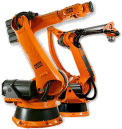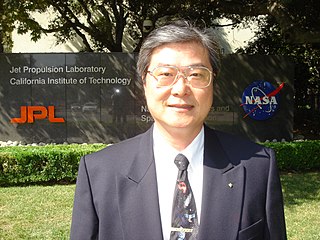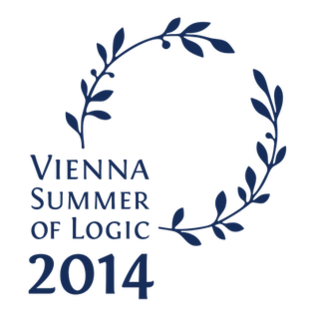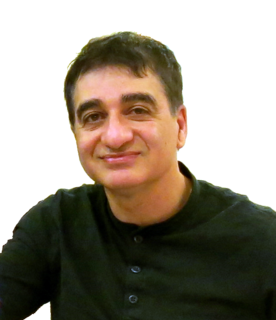
In computing, ambient intelligence (AmI) refers to electronic environments that are sensitive and responsive to the presence of people. Ambient intelligence was a projection on the future of consumer electronics, telecommunications and computing that was originally developed in the late 1990s by Eli Zelkha and his team at Palo Alto Ventures for the time frame 2010–2020. Ambient intelligence would allow devices to work in concert to support people in carrying out their everyday life activities, tasks and rituals in an intuitive way using information and intelligence that is hidden in the network connecting these devices. As these devices grew smaller, more connected and more integrated into our environment, the technological framework behind them would disappear into our surroundings until only the user interface remains perceivable by users.
Anatoly Abramovich Shalyto is a Russian scientist, doctor of sciences, and professor. He was awarded by Russian State Government in 2008 for his achievements in education and his development of the technology for Automata-based programming called "Switch-technology." He is also an initiator of the Open Project Documentation Initiative.
The Design Automation Conference, or DAC, is an annual event, a combination of a technical conference and a trade show, both specializing in electronic design automation (EDA).

The following outline is provided as an overview of and topical guide to automation:
The IEEE Circuits and Systems Society is a society of the Institute of Electrical and Electronics Engineers (IEEE). It is also known by the acronym IEEE CASS. In the hierarchy of IEEE, the Circuits and Systems Society is one of almost 40 technical societies organized under the IEEE's Technical Activities Board.

The International Conference on Computer-Aided Design (ICCAD) is a yearly conference about electronic design automation. From the start in 1980 until 2014 the conference was held in San Jose, California. It is sponsored by the IEEE Circuits and Systems Society, Computer-Aided Design Technical Committee (CANDE), the IEEE Council on Electronic Design Automation (CEDA), and SIGDA, and in cooperation with the IEEE Electron Devices Society and the IEEE Solid State Circuits Society.

The IEEE Communications Society (ComSoc) promotes the advancement of science, technology and applications in communications and related disciplines. It fosters presentation and exchange of information among its members and the technical community throughout the world. The Society maintains a high standard of professionalism and technical competency. The IEEE Communications Society is a professional society of the IEEE.
IEEE Computer Society is a professional society of the Institute of Electrical and Electronics Engineers (IEEE). Its purpose and scope is "to advance the theory, practice, and application of computer and information processing science and technology" and the "professional standing of its members." The CS is the largest of 39 technical societies organized under the IEEE Technical Activities Board.

Wai-Chi Fang is a Taiwanese engineer.
The IEEE Nanotechnology Council, also known as IEEE NTC, is one of seven councils of the Institute of Electrical and Electronics Engineers.
The Symposia on VLSI Technology and Circuits are two closely connected international conferences on semiconductor technology and circuits, thereby offering an opportunity to interact and synergize on topics of joint interest, spanning the range from process technology to systems-on-chip. The Symposia take place once a year around the middle of June at locations alternating between Kyoto, Japan and Honolulu, USA. They bring together managers, engineers, and scientists from industry and academia around the world to discuss challenges in manufacturing and design of Very-large-scale integration (VLSI) circuits. The Symposium on VLSI Technology started in 1981 while the Symposium on VLSI Circuits was established in 1987. Beside regular presentations of technical papers, the Symposia comprise short courses, panel sessions, and invited talks conducted by experts in the field from both Industry and Academia.

Kenneth C. Smith is a Canadian electrical engineer and professor. He is currently Professor Emeritus, University of Toronto.

The Vienna Summer of Logic was a scientific event in the summer of 2014, combining 12 major conferences and several workshops from the fields of mathematical logic, logic in computer science, and logic in artificial intelligence. The meetings took place from July 9 to 24, 2014, and attracted more than 2000 scientists and researchers.

Massoud Pedram is an Iranian American computer engineer noted for his research in green computing, energy storage systems, low-power electronics and design, electronic design automation and quantum computing. In the early 1990s, Pedram pioneered an approach to designing VLSI circuits that considered physical effects during logic synthesis. He named this approach layout-driven logic synthesis, which was subsequently called physical synthesis and incorporated into the standard EDA design flows. Pedram's early work on this subject became a significant prior art reference in a litigation between Synopsys Inc. and Magma Design Automation.

Saraju Mohanty is an American professor of the Department of Computer Science and Engineering, and the director of the Smart Electronic Systems Laboratory, at the University of North Texas in Denton, Texas. Mohanty received a Glorious India Award - Rich and Famous NRIs of America in 2017 for his contributions to the discipline. Mohanty is a researcher in the areas of "consumer electronics for smart cities", "application-Specific things for efficient edge computing", and "methodologies for digital and mixed-signal hardware". He has made significant research contributions to security and IP protection of consumer electronic systems, hardware-assisted security and protection, high-level synthesis of digital signal processing (DSP) hardware, and mixed-signal integrated circuit computer-aided design and electronic design automation. Mohanty has been the Editor-in-Chief (EiC) of the IEEE Consumer Electronics Magazine since 2016. He has held the Chair of the IEEE Computer Society's Technical Committee on Very Large Scale Integration since September 2014. He holds 4 US patents in the areas of his research, and has published 220 research articles and 3 books.
Gabriel Alfonso Rincón-Mora is a Venezuelan-American/Hispanic-American electrical engineer, scientist, professor, inventor, and author who was elected Fellow of the American National Academy of Inventors (NAI) in 2017, Fellow of the Institute of Electrical and Electronics Engineers (IEEE) in 2011, and Fellow of the Institution of Engineering and Technology (IET) in 2009 for contributions to energy-harvesting and power-supply integrated circuits (ICs).

IEEE Rebooting Computing is a global initiative launched by IEEE that proposes to rethink the concept of computing through a holistic look at all aspects of computing, from the device itself to the user interface. As part of its work, IEEE Rebooting Computing provides access to various resources like conferences and educational events, feature and scholarly articles, reports, and videos.








